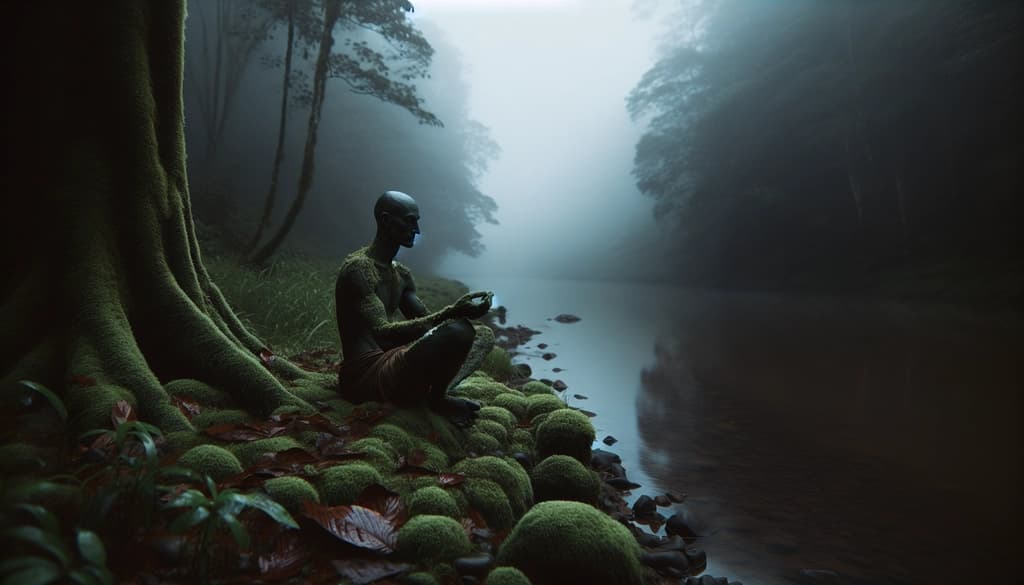Being Okay With Uncertainty: What Death Reveals About Who We Are

Sitting With What Can’t Be Fixed
For years, uncertainty gnawed at the edges of my daily life — not just the minor things, but the real, stomach-clenching not-knowing. When the call came about my friend’s passing, it wasn’t just his absence that undid me. It was the raw uncertainty about what happens next, for him, for me, for the relationships I thought I understood.
Meditation teachers used to talk about 'letting go,' but it sounded hollow before I lost someone I couldn’t imagine living without. The advice clanged like spoons against an empty pan. Then the grief came — and with it, a strange permission to stop pretending I had answers. I remember sitting on my floor, knees hugged to my chest, feeling my breath stutter. That moment wasn’t acceptance, not yet. It was something rawer: the realization that I had no control and nowhere else to go.
Some days, even the idea of being "okay with uncertainty" felt impossible. That was when I stumbled into deeper questions about how everything passes — or transforms. If you’re curious about the larger arc of things, you might want to explore what is impermanence, and how it shapes the experience of loss and renewal.
What Death Taught Me About Self
Death has a way of rearranging the furniture of your inner world. Things you counted on — ideas about safety, fairness, permanence — get swept off the table. In the early days of mourning, I found myself searching for meaning, for some story that would tidy the jagged edges. But as the weeks passed, it was the not-knowing itself that became strangely precious.
If you’ve wondered why we fear endings so much, it may help to reflect on the roots of that fear. For a thoughtful perspective, consider the ways that why we fear death shape our approach to life and identity.
There’s a myth that acceptance means peace is immediate. My experience was more chaotic: little moments of calm mixed with waves of ache and confusion. Over time, I realized I could be both scared and okay; both devastated and, in odd flashes, grateful. Death, for all its devastation, showed me the parts of myself that were wide enough to hold both pain and joy.
All of this nudged me toward the old philosophies of letting go without abandoning care. If you find yourself wrestling with the tension between loving and releasing, you might find solace in exploring the philosophy of non-attachment. It isn’t about hardening the heart, but discovering how to stay open, even as things change.
Letting Go With Grace (Or Not)
We’re taught to valorize 'letting go with grace,' as if detachment is a sign of spiritual arrival. My letting go was clumsy, uneven, sometimes angry. It’s not a gentle process — it’s a living, breathing, sometimes howling act. If you’re in that churn, you’re not failing; you’re being honest. Some days the only grace I found was remembering to eat, or feeling sun on my skin.
Letting go — and the surrender that’s sometimes needed — doesn’t come as a single, graceful act. If you’re seeking a softer look at what it means to release control, you could turn toward the deeper nuances of acceptance and surrender meaning, as a way of honoring your own process, however it unfolds.
You don’t have to do it beautifully. Sometimes, the bravest act is to let yourself be awkward in your pain, to not rush your own unfurling. If it helps, you can experiment with softening the belly on an exhale, or letting your shoulders drop a little, noticing the tremble underneath. If that’s not possible today — that’s okay too. You get to decide what’s gentle enough for you.
Allowing Pain And Joy To Exist Together
What I never imagined about acceptance is how non-linear it is. There are mornings when I wake braced against grief, and afternoons when a bird’s song surprises me into laughter. The mind might insist we have to 'finish' one emotion before the other appears. But the body knows otherwise — that pain and joy can commingle, braid themselves through a single afternoon.
Research gently supports this: people who practice mindfulness, even in sorrow, tend to develop a deeper tolerance for ambiguity. Their brains don’t erase the pain, but seem to offer a softer landing for it. I think of this not as resilience but as a kind of weathering, a gradual tolerance for the mystery. If you want to spend more time meeting life as it happens, moment by moment, there’s something nourishing about living in the present moment, and letting that be enough.
I used to believe that death was absolute absence. But when I pay quiet attention — even in loss — a sense of transformation stirs at the edges. If you long to see death through a gentler lens, perhaps reflecting on death as transformation might offer glimmers of comfort or courage.
If Uncertainty Feels Like Too Much
If the ache is sharp, if uncertainty feels like drowning — know that you get to slow down. You can pause. You can even stop. Sometimes the most radical acceptance is admitting, 'This is too much, right now.' I find comfort in the company of others who’ve also stumbled, who sit near the fire of not-knowing and do not look away. And if you wish to practice receiving life on its own terms, the gentle exploration of how to accept what is might support you on days when uncertainty feels like too much.
May you find sanctuary in the wild places inside you, even when nothing feels certain. May you know that acceptance is not a finish line, but a changing tide — and you are worthy of meeting it exactly as you are.
